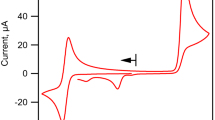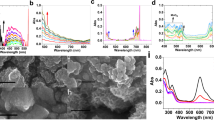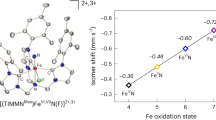Abstract
The only compound of quadrivalent rhodium described in the literature is the green, hydrated oxide obtained in the impure form by passing chlorine into a solution of sodium hexachlor-rhodate(III), (Na3RhCl6), containing excess sodium hydroxide1. Grube and Gu2 obtained greenish-violet coloured solutions by oxidizing anodically rhodium salts in sulphuric, nitric and perchloric acids. Although no solid products were isolated, the authors deduced from potentio-metric titrations that these solutions contained some quadrivalent and hexavalent rhodium. The redox potential of the trivalent-quadrivalent couple was estimated at + 1·40 volts.
This is a preview of subscription content, access via your institution
Access options
Subscribe to this journal
Receive 51 print issues and online access
$199.00 per year
only $3.90 per issue
Buy this article
- Purchase on Springer Link
- Instant access to full article PDF
Prices may be subject to local taxes which are calculated during checkout
Similar content being viewed by others
References
Alvarez, C. R., 101, 851 (1885). Wohler and Ewald, Z. anorg. allg. chemie, 201, 151 (1931).
Grube and Gu, Z. Electrochem., 43, 397 (1937).
Author information
Authors and Affiliations
Rights and permissions
About this article
Cite this article
DWYER, F., NYHOLM, R. Isolation of a Quadrivalent Rhodium Complex. Nature 160, 502–503 (1947). https://doi.org/10.1038/160502c0
Issue Date:
DOI: https://doi.org/10.1038/160502c0
Comments
By submitting a comment you agree to abide by our Terms and Community Guidelines. If you find something abusive or that does not comply with our terms or guidelines please flag it as inappropriate.



